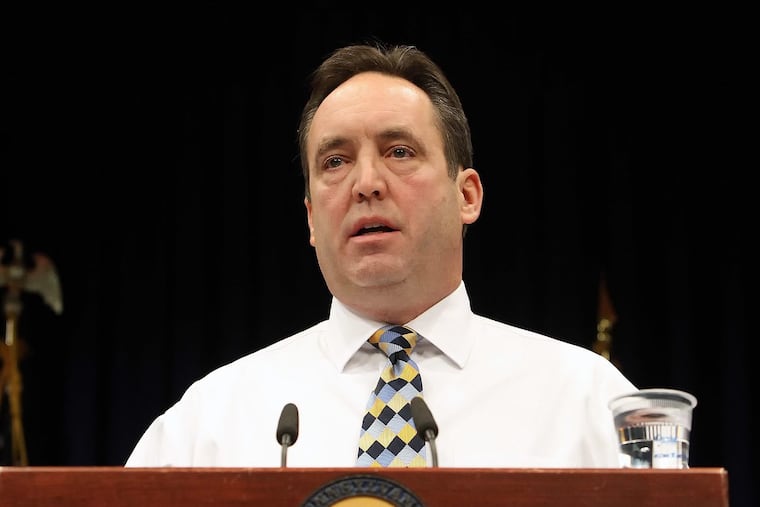Top Pa. Senate Republicans: Sex-abuse-victims bill has ‘glaring problems’
The two top Senate Republican leaders rattled off a list of concerns with the bill, which was approved by the House on Tuesday.

HARRISBURG – The top two Republican state Senate leaders on Tuesday slammed the brakes on the frenzied push for legislation to allow more victims of child sexual assault to sue their attackers for decades-old abuse.
Majority Leader Jake Corman (R., Centre), standing with President Pro Tempore Joe Scarnati (R., Jefferson), said there were "glaring problems" with the bill approved by the House that would suspend for two years the statute of limitations so that older victims can file civil suits.
Corman vowed to address the concerns within days. But he did not commit to a specific solution, signaling that the proposed two-year window for lawsuits – a crux of the bill sought by victim advocates, Gov. Wolf, and the state Attorney General's Office – could be in peril.
"We're going to work through that," Corman said. "We haven't decided no or yes."
The clock is ticking: The Senate has just eight more voting days scheduled before the end of the legislature's two-year term. The House has just seven. Any bills not signed into law before then will have to be reintroduced next year and start the lengthy legislative process from scratch.
Corman rattled off a list of concerns with the bill, which was overwhelmingly approved by the House earlier Tuesday. He said it does not incorporate all of the recommendations contained in the Aug. 14 grand jury report on Catholic clergy abuse in nearly every diocese in the state. Not included in the bill, he said, are provisions that would strengthen mandatory reporting requirements and outlaw nondisclosure agreements that bar victims from talking to law enforcement.
Corman also said Republican senators are unhappy with language in the bill that would allow victims to sue public institutions, but only in cases of "gross negligence."
That, he said, effectively would create two classes of victims. It shouldn't matter if the abuser is a priest, a doctor, or a public school teacher, he added.
Rep. Mark Rozzi (D., Berks), who championed the push for a two-year reprieve in the civil statute of limitations, said he hopes to work out a swift resolution with the senators. But he took issue with a number of Corman's statements.
Rozzi said state law already applies different standards in child-sex-abuse lawsuits filed against public institutions. He also said that placing all four of the grand jury's recommendations in one bill would run afoul of a prohibition on bills that pertain to multiple topics.
"To me, it sounds like more political cover and protectionism," said Rozzi, who was raped by a priest when he was 13.
For victims, he said, the legislative ping-pong has been emotionally draining.
"We already feel worthless. We have this thought that nobody truly cares about us," said Rozzi, adding: "It's gut-wrenching because we have always been second fiddle to the lawyers and lobbyists."
Just a day earlier, victims and their supporters flooded the Capitol for a day of rallies. Many said they felt buoyed by the House's swift passage of a bill that could grant many of them the ability to sue.
Some remained in the Capitol on Tuesday, including sisters from a Harrisburg-area family who were abused by the same priest. The women met with Corman in his office early in the day.
Also spotted in the Capitol making the rounds were lobbyists for the Catholic Church and the insurance industry, which have fought hard to defeat any measures allowing for retroactive civil suits. The two have argued that a reprieve from the statute of limitations is unconstitutional.
Late last week, the state's eight Roman Catholic bishops said they were open to creating a victim compensation fund. The move was seen by some as a preemptive strike to ward off what appeared to be growing momentum in the Capitol for a window.
Scarnati, who opposes retroactive changes to the statute of limitations, has said he supports a victims' compensation fund. Standing beside Corman on Tuesday, Scarnati remained mostly silent.
As he was rushing to the elevator to get to his office, trailed by reporters and TV crews, he refused to say whether he could support a two-year lifting of the statute of limitations.
"We will continue to work on it," he said. "My goal is to get compensation to the victims, do it in a timely and efficient way and one that is supported by the Constitution."